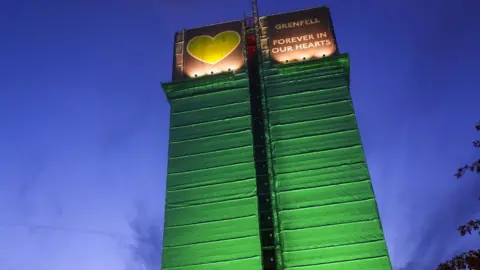Grenfell Tower: Cladding firm 'stretched the truth' on fire safety
 PA Media
PA MediaA company that made insulation used on Grenfell Tower was "stretching the truth" by claiming its product was appropriate for use on high-rise buildings, a former employee has said.
Kingspan fire-tested its cladding product in 2005, but changed the insulation's formulation the next year.
The new version of the product failed to repeat the same performance.
Ex-technical director Ivor Meredith told the inquiry into the fire this was "common knowledge" at Kingspan.
The first phase of the Grenfell inquiry concluded that cladding put on the west London tower block during its refurbishment fuelled the fire in June 2017 in which 72 people died.
The inquiry is now examining how the blaze could have happened in the first place.
Mr Meredith described a fire test using the new version of Kingspan's K15 in 2007 as a "raging inferno", with the insulation "burning on its own steam".
He told the inquiry he was shocked by what he saw.
Despite this, Kingspan continued to use the results from the original 2005 test to sell its material as appropriate for use on high-rise buildings.
Kingspan K15 insulation was used in the flammable cladding system mounted on to Grenfell Tower, alongside Celotex RS5000.
'Not suitable'
In 2015, two years before the Grenfell Tower fire, Mr Meredith told his managers he had been put in a position where he had been asked to maintain the appearance of fire safety performance that - as he put it - "that perhaps our products don't deserve".
He added that many would question the company "playing in [a] market [they were] not suitable for".
The evidence comes a month after it was confirmed that test certificates for K15 from the 2005 tests had been withdrawn.
A letter sent to the inquiry from Kingspan dated 23 October - shown in full to Monday's hearing - read: "We have undertaken a comprehensive review of all past and current test data which relates to K15."
It added: "It became apparent that the K15 manufactured in 2005 would not be representative of the product currently sold on the market from 2006 to today.
"While both products are still phenolic foam, Kingspan is now of the view that there are sufficient differences to consider withdrawing the test report."
